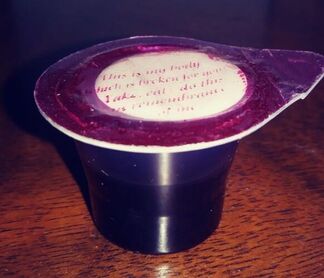We don't want anyone who is uncomfortable being in a group to feel obligated to participate. We believe we have a very safe and responsible procedure that also preserves the reverence and power of the Sacrament, but we all have to make the best choices we can about where and how we go out these days. It can help to bear in mind that the coronavirus is a respiratory virus. People contract it by breathing it in; food does not seem to be a source of transmission. This appears to be a disease we give each other directly, by proximity, rather than through a medium like the host or the chalice.
That said, we are being still more cautious, and so to minimize contact we are for now distributing only the host and not the chalice. I'm confident that we can find a good and safe way to include the chalice, but we will read up and plan out how best to do that before we make any changes.
A few people have mentioned this product to me as a possible answer, so I thought I'd share my reasons for not wishing to use it:

Second, I've avoided these products for the less theological reason that I dislike the waste. One problem with having a lot of individual packages rather than a single shared meal is that it leaves a lot of plastic to be discarded. Apart from the environmental concerns, it's spiritually and aesthetically discouraging to have to throw away a lot of packaging after celebrating the most important aspect of Christian worship. After spending many years watching little buckets fill with plastic cups, still coated with what we were just calling the Blood of Christ, it's not something I think communities should be doing.
One challenge of this period has been thinking through changes to our life together, as worshipers and in many other ways. One problem with Christian worship (especially among Lutherans, for whatever reason) is that the exception can very quickly become the rule. We've been careful about doing things in worship or education that we wouldn't be comfortable with under normal circumstances, if only because it's easier to establish an expectation than it is to take it away.
So I greatly appreciate your patience and cooperation as we continue to do the best we can, faithfully, reverently, and safely, to share the fullness of God's grace in Word and Sacrament.
For those interested, some further reading on the Sacrament:
"The Use of the Means of Grace," a 1997 ELCA document that gives helpful guidance on baptism, preaching, and the Eucharist (including the indication that the sacrament should be individually administered by the pastor, and all the gifts placed on the altar together).
From the Apology of the Augsburg Confession on the Sacrament of the Altar
I've written about Holy Communion here (with specific reference to the sealed packages, it turns out), and early in the pandemic when many churches were trying "virtual" communion. It's also Chapter 3 of my book, which I'll post here for anyone interested (please be a dear and don't download the whole thing; if you'd like a copy and the price will put you out, just let me know and I'll get one to you).

 RSS Feed
RSS Feed